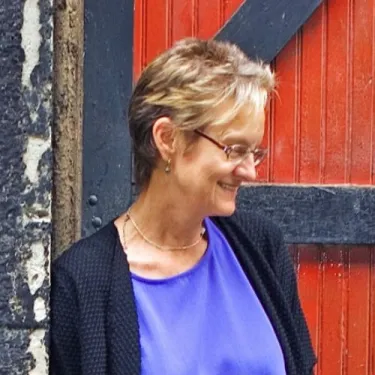Heather McHugh
Visiting Poet

Heather McHugh is the author of six books of poetry, a book of essays, and translations from several languages. Called a “postmodern metaphysician” by Booklist, McHugh is widely praised for her attention to and fascination with language itself. Her poems, which have won many awards, often revolve around complicated wordplay and etymological games. Robert Hass describes her as “a poet for whom wit is a form of spiritual survival.” The Voice Literary Supplement declares that McHugh’s poems “are honest and essential as a blood count.”
Born in California and raised in Virginia, McHugh entered Harvard at the age of sixteen and later did graduate work at the University of Denver. Her first book of poems, Dangers, was published in 1977. Subsequent volumes include To the Quick, Hinge & Sign, The Father of the Predicaments, and Broken English: Poetry and Partiality, a collection of essays. Her translation work includes Euripides’ Cyclops and Glottal Stop: Poems of Paul Celan (with her husband, Nikolai Popov).
McHugh has taught at many universities, including the Iowa Writers’ Workshop. She is on the faculty of the Warren Wilson College M.F.A. program and is Milliman Distinguished Writer-in-Residence and Professor of English at the University of Washington in Seattle.
Select Poems
‘Twas grace that taught my heart to fear.
Calm comes from burning.
Tall comes from fast.
Comely doesn’t come from come.
Person comes from mask.
The kin of charity is whore,
the root of charity is dear.
Incentive has its source in song
and winning in the sufferer.
Afford yourself what you can carry out.
A coward and a coda share a word.
We get our ugliness from fear.
We get our danger from the lord.
From THE FATHER OF THE PREDICAMENTS (Wesleyan University Press, 1999)
There, a little right
of Ursus Major, is
the Milky Way:
a man can point it out,
the biggest billionfold of all
predicaments he’s in:
his planet’s street address.
What gives? What looks
a stripe a hundred million
miles away from here
is where we live.
*
Let’s keep it clear. The Northern Lights
are not the North Star. Being but
a blur, they cannot reassure us.
They keep moving – I think far
too easily. September spills
some glimmers of
the boreals to come:
they’re modest pools
of horizontal haze, where later
they’ll appear as foldings in the vertical,
a work of curtains, throbbing dim
or bright. (One wonders at
one’s eyes.) The very sight
will angle off in glances or in shoots
of something brilliant, something
bigger than we know, its hints uncatchable
in shifts of mind … So there
it is again, the mind, with its
old bluster, its self-centered
question: what
is dimming, what is bright?
The spirit sinks and swells, which cannot tell
itself from any little luster.
From THE FATHER OF THE PREDICAMENTS (Wesleyan University Press, 1999)
The literate are ill-prepared for this
snap in the line of life:
the day turns a trick
of twisted tongues and is
untiable, the month by no mere root
moon-ridden, and the yearly eloquences yielding more
than summer’s part of speech times four. We better learn
the buried meaning in the grave: here
all we see of its alphabet is tracks
of predators, all we know of its tense
the slow seconds and quick centuries
of sex. Unletter the past and then
the future comes to terms. One late fall day
I stumbled from the study and I found
the easy symbols of the living room revised:
my shocked senses flocked to the window’s reference
where now all backyard attitudes were deep
in memory: the landscapes I had known too well-
the picnic table and the hoe, the tricycle, the stubborn
shrub-the homegrown syllables
of shapely living-all
lay sanded and camelled by foreign snow …
From HINGE & SIGN, POEMS 1968-1993 (Wesleyan University Press, 1994)